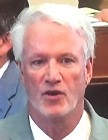 |
 |
Nicole Collier
Texas House
D-Fort Worth |
|
State Rep. Nicole Collier landed the initial blow in the fight against the GOP election bill with a cameo appearance that derailed the measure in a House committee on which she did not have a seat the first time the sponsor tried to take a vote on it in March. Collier felt an obligation to participate in the public hearing that the Elections Committee that GOP Speaker Dade Phelan had appointed without a single Black member like herself. As the Texas Legislative Black Caucus chair who doubles as a trial lawyer, Collier had some questions for the panel's chairman and points that she wanted to get on the record for an eventual battle on the voting bill at the courthouse. But State Rep. Briscoe Cain refused to let Collier quiz him on the House version of the measure that he'd authored as the elections panel chairman. When Collier persisted in spite of the sponsor's cold shoulder, Cain crumbled in the heat of the confrontation that set the tone for the fight on Senate Bill 7 and offered the first major foreboding on the fate of the voting measure that Collier would have a significant part in killing before a final vote at the session's end. A certified mediator who's a member of State Senator Royce West's law firm in Dallas, Collier has been more of a bridge builder than partisan bill assassin during five regular sessions in the House. She worked her way up to the station that she landed initially in 2019 when Republican Dennis Bonnen was the speaker and named her as the Criminal Jurisprudence Committee chair. Collier retained the post when Phelan claimed the gavel in January. As a Democratic lieutenant on the Republican leadership team, Collier seemed to be very selective about the fights that she picked or entered this year. The good relations with Phelan appeared to pay off when he didn't try to stop Collier and most of her fellow Democrats from strolling out of the chamber on the eve of the session's last day in a quorum killing ambush. It was no coincidence that Collier turned out to be the House Democrats' de facto spokesperson on multiple national news shows on the day after SB 7 died for the time being. |
|
 |
Joan Huffman
Texas Senate
R-Houston |
|
It might have looked like Republican State Senator Joan Huffman was taking one for the team when Lieutenant Governor Dan Patrick appointed her as the chair of the Jurisprudence Committee this year after three regular sessions at the head of the dramatically more powerful State Affairs Committee in the Texas Legislature's upper chamber. Oh sure, there was the easy initial speculation on the possibility that Huffman would feel more at home in the new station as a former prosecutor who'd served as a state district judge for criminal cases in Harris County as a Houston resident. Such a selfless move - in the event that it wasn't forced on her - would make it possible to promote GOP State Senator Bryan Hughes of Mineola to the more prestigious and highly influential role as the State Affairs Commmittee chairman. Patrick and Hughes both are located miles to the right of Huffman on the political ideology scale - and the two have common bonds as white men who couldn't be more simpatico when it comes to old-fashioned religion and morality. That's not to say that Huffman cherishes her faith any less than the lieutenant governor and the current state affairs boss. But Huffman is establishment personified - and while she did vote for every worthless partisan soda pop bill that Patrick served up - she helped keep the most conservative Senate in Texas history grounded to some degree with a focus on real issues in a part that turned out to be a lot bigger than anyone envisioned at the outset. Huffman's shift to jurisprudence - as it turned out - hadn't been a demotion or slight. Her selection as the panel's chair - unbenownst to many - had been a sign that the Senate had a second committee that would be in the same league with state affairs if not higher up the Patrick leadership ladder. Patrick - an entertainment personality who's a junkie for attention - is actually a lot smarter than he looks on Fox News. Patrick sent a sweeping electric grid regulation and repair package to the Jurisprudence Committee as the most significant piece of legislation that would be considered at the statehouse this year beyond the state budget. That was not the typical route for that and several other key bills that were routed through Huffman's committee off the beaten traditional path. Jurisprudence would become State Affairs II by the time the session rolled to a close. Then Patrick - lo and behold - made it all official when he announced last week that he'd expanded the Jurisprudence Committee's powers and scope significantly - an unusual move that's clearly a testament to Huffman's abilities, competence, tough outer edge and the serious approach that she brings to a Senate over which Donald Trump's state campaign chairman presides. Huffman's committee would take the first vote on the police defunding bill that she'd sponsored and passed during the final weekend of the session with a half-dozen Senate Democrats on board and only four in dissent. The Jurisprudence Committee handled a package of human and sex trafficking measures that Huffman conceived and shepherded to Governor Greg Abbott's desk with several different House sponsors including veteran Democratic State Rep. Senfronia Thompson of Houston. |
|
 |
Lyle Larson
Texas House
R-San Antonio |
|
State Rep. Lyle Larson isn't ranked as one of the 10 best Texas legislators as a result of any singular achievements or victories that he scored as the sponsor of major legislation in the regular session in 2021. The San Antonio Republican - to tell the truth - is one of the few lawmakers who failed to send a single bill to Governor Greg Abbott this year. Larson only managed to pass one piece of legislation out of the House - a measure that would have strengthened the planning process for water projects around the state. The Larson measure was dead on arrival in the Senate where it never received a committee assignment much less a hearing or a vote. Larson had been on the losing side in the race that GOP Speaker Dade Phelan won late last year with substantial help from predecessor Dennis Bonnen. Larson alienated Bonnen after the 2019 session when he and several GOP colleagues confronted him on a primary targeting plan and withdrew their support for his re-election campaign. Phelan carried out his mentor's revenge with the busting of Larson and two of the other three Republicans who'd turned against Bonnen from influential positions on the House leadership team. Larson had chaired the Natural Resources Committee during Bonnen's single term as speaker after leading the panel during Republican Joe Straus' final term with the gavel. As a casualty in a political turf war that his team lost, Larson didn't have a chance to make much of an impact on the 2021 session in terms of tangible production on the assembly line in Austin. Larson made the all-star team based almost exclusively on two votes that he cast against the same bill this year as the only lawmaker on either side of the aisle to break ranks with their party on the GOP's attempt to restrict voting in Texas under the guise of fighting voter fraud. Larson's votes against the election plan in Senate Bill 7 gave the Republicans a token profile in courage at a statehouse where the rest of them all appeared to be living in fear and voting exactly the same more than ever as a result. Larson's defiance will have more of a long-term value that no one anticipates now when time shows that Republicans can vote against Donald Trump and live to tell about it. |
|
 |
Jane Nelson
Texas Senate
R-Flower Mound |
|
State Senator Jane Nelson made it possible for the Texas Legislature's other Republicans to focus on ways to make their party stronger and more competitive with absolute certainty that a grown up would take care of the only bill that they really had to pass in the regular session in 2021. Nelson already had crafted four biennial appropriations bills that had passed with overwhelming support on both sides of the aisle as the Senate Finance Committee chair. With Texas flush in federal funds that Democrats in Congress approved without a single GOP vote, the cultivation and passage of a state spending plan for the next two years would be a foregone conclusion with Nelson at the wheel again as the chief author on Senate Bill 1. Nelson had a very capable House counterpart to mentor in a conference committee that she led in tandem with GOP State Rep. Greg Bonnen of Angleton as the leader of the House Appropriations Committee and co-chair of the conferees from the lower chamber on SB 1. As a surgeon who's the last speaker's brother, Bonnen was smart enough to know that the budget is Nelson's bailiwick and that he'd be wise to follow her lead and learn from the experience. Nelson brings an intrinsic added value to the Senate as someone who learned from Democrats like Bob Bullock and Pete Laney that government is the art of consensus if it's going to be truly representative for all the people. Bullock was the lieutenant governor when Nelson burst on the scene in the 1990s as a soccer mom who'd ousted one of his top allies and quickly established herself as the upper chamber's most conservative member. That's no longer the case in a Texas majority party that had been moving steadily to the right before Donald Trump turned the GOP into a personal weapon for acts of mass destruction like the riot at the U.S. Capitol that killed five people including a police officer just eight days before the Legislature convened for the 2021 session in January. Nelson voted with her fellow Republicans approximately 100 percent of the time in the regular session in 2021. But you can say the same about almost all the GOP legislators in Texas where they were scared to death of casting a vote that Trump and the extremists who've hijacked the party might not like. She was just another frightened sheep in that regard in a Senate where Lieutenant Governor Dan Patrick can finally declare victory in a mission to dismantle the bipartisan tradition that made the Texas Legislature's upper chamber a model for the nation before its transformation in recent years to a popsicle plant. Patrick - to his credit - has given the Senate a vestige of old-school mainstream by giving Nelson the leeway to do things her way on the budget. Patrick gave the impression that he only cares about white Republicans based on the conference committee that he appointed for the budget in Senate Bill 1. The Senate's 13 Democrats appeared to trust Nelson to look out for everyone else based on their unanimous votes for the state budget that she crafted as the only piece of legislation that the Legislature had a constitutional duty to pass. |
|
 |
Chris Paddie
Texas House
R-Marshall |
|
State Rep. Chris Paddie gave the GOP majority a dose of old-school normal in the critical part that he played as the chairman of the powerful State Affairs Committee - the traditional burial ground for predictable conservative theme bills that the Senate sends over like clockwork every two years. Paddie gave the House Republicans someone to do the real work so the others could focus on party priorities that are purely symbolic or designed without a hint of a damn for the greater good in mind. Paddie might have perceived his initial role to be more gravedigger than quarterback at a statehouse where the bathroom bill probably would have passed if it had dawned on Lieutenant Governor Dan Patrick that it could. Paddie paved paths to the trash for bills that would have banned social media political censorship, local government interference in private businesses and publicly-funded lobbying in the latest assault by the state on cities that are run by Democrats. But Paddie made it appear like those measures were moving to keep the panel he leads from catching the singular blame for their eventual demise without votes in a traffic jam at the end of the session. An East Texas native who served as the mayor in Marshall, Paddie seemed out of character as the sponsor of the Senate's proposed ban on lobbying that's funded by cities and other local government entities. Paddie guided the lobby legislation to the floor for a vote that the House never took after he had it postponed five times over the course of two days until time ran out on the bill. Speaker Dade Phelan turned to Paddie on the session's most imposing challenge after the electricity grid failed during an epic ice storm after a full decade of neglect by the ruling Republicans. Paddie took the lead on a package of legislation that aimed to bolster the antiquated Texas power system and a regulatory system that had been lax and inept in its oversight of the grid. Paddie had been the only high-ranking Phelan lieutenant with primetime experience and no major baggage. At a session of wagon circling by Republicans who moved like a scared herd in fear of their own party, Paddie was the obvious choice for point person on electricity because he understands that government is the art of consensus when it's actually for all the people. |
|
 |
Matt Schaefer
Texas House
R-Tyler |
|
Republican State Rep. Matt Schaefer of Tyler was one of the original crazies before crazy was cool at the statehouse in Austin. Schaefer was the first chairman of the Texas Freedom Caucus - a tea party revolutionary group that specialized in obstruction and chaos until its taming and assimilation into a GOP majority whose members are all just as conservative now. Schaefer's legislative agenda in 2021 featured proposals that would have given the unborn the right to an attorney, banned mask orders and prohibited abortion discrimination based on race or sex. Schaefer filed one bill that would have made it possible for election officials to purge voter rolls with information from the state criminal database. Schaefer cast himself as a dystopian visionary with a joint resolution that he crafted in a move that would have guaranteed Texans the right to operate vehicles with old-fashioned human decision making when the time comes when most of the traffic is being powered by artificial intelligence. But Schaefer has never been a run-of-the-mill right winger - having won a seat in the House after ousting the state's most conservative lawmaker in the primary election in 2021 after running hard to his right. An attorney who played junior college football, served in the Navy reserves and worked for Texan Phil Gramm in the U.S. Senate, Schaefer looked relatively mainstream at first blush on paper when he emerged as a House candidate in 2012. Schaefer came across like a chicken-fried Tom Clancy in his first re-election race two years later when he raised the specter of covert military operations in Mexico to mess with drug cartels there. Schaefer spent his first three terms harassing House leaders when Republican Joe Straus had been the speaker. Schaefer passed a grand total of one bill in his first six years in the west wing. Schaefer prospered by his own standards with Republican Dennis Bonnen at the helm as speaker in regular session number four - sending five measures to Governor Greg Abbott as the chief House sponsor in 2019. That raised his bill-passing average to 1.5 per regular session before boosting it to 2.0 with four proposals that cleared both chambers this year. But Schaefer's only significant achievement in terms of production had come four years ago as the sponsor of an amendment that made an anti-immigrant bill substantially stronger than House leaders had envisioned. Let the record show that Schaefer has a major piece of legislation to his credit now after his casting by current GOP Speaker Dade Phelan in the lead role on a bill that will give people the legal right to carry guns without permits from the state. While the Republicans had the votes to pass the so-called constitutional carry plan, Schaefer appeared to be perfectly capable of fumbling it away given his abysmal lack of experience in the art of passing legislation that required a consensus among the Republicans at least. Despite a game of charades that Lieutenant Governor Dan Patrick played for a while with the no-permit needed gun measure, Schaefer actually made it look easy, guiding the House Bill 1927 through the lower chamber with all of the Republicans and a handful of Democrats from heavily Hispanic districts in South Texas on board. Schaefer led the House conferees who negotiated a compromise on the measure that went on to pass without a hitch. |
|
 |
Charles Schwertner
Texas Senate
R-Georgetown
|
|
GOP State Senator Charles Schwertner of Georgetown bounced back in style in the 2021 regular session after a long stint on the bench for unbecoming behavior involving lascivious tweets and a coed a few years ago. Schwertner had done two years in the doghouse where Lieutenant Governor Dan Patrick sends Senate Republicans who've been bad or failed to vote his way on personal priorities. After busting Schwertner from his post as the Health & Human Services Committee chairman in 2019, Patrick gave the Central Texan a golden opportunity for a second chance as the Senate Administration Committee boss at the outset of the regular session this year. Schwertner emerged as Patrick's most valuable utility player for unexpected challenges - getting the early call on a package of proposals to fortify the independent Texas electric grid that failed in the height of an epic freeze in February. Schwertner had been a surprise choice for the sponsor's job on the multi-dimensional measure that he wrapped into Senate Bill 3 and negotiated as the lead conferee for the east wing. An orthepedic surgeon who served one term in the House before a promotion to his current post in 2012, Schwertner gave Patrick someone he could trust to come up with a band-aid for a monster mess that lawmakers were not prepared to handle or capable of resolving without the luxury of planning in advance. SB 3 doesn't have the teeth to really eliminate the threat of blackouts like Governor Greg Abbott has suggested it will do. But it's insurance for legislators who could be crucified if they hadn't passed some sort of bill for the power grid before the state goes dark again. Schwertner's steady hand on damage control with SB 3 led to an even bigger part as the belated Senate sponsor of the GOP's prized constitutional carry bill that will allow people to carry guns without permits from the state. But this required Schwertner's passive participation in some theatrics that began with an appointment from Patrick as the chairman on a Senate Special Committee on Constitutional Issues that he'd created for the exclusve task of hearing the session's marquee gun bill. Schwertner moved the measure out of committee without delay - and he didn't seem to press the issue when Patrick vaguely claimed one day that the bill didn't have a sufficient number of votes to pass the Senate. That put the lieutenant governor in position to save the bill as long as Schwertner would cooperate by keeping the names of the Senate Republicans who opposed HD 1927 between the two of them. The comeback came with a prize after the session adjourned when Patrick selected Schwertner to chair the Business & Commerce Committee in GOP State Senator Kelly Hancock's place after his busting by the lieutenant governor for disobedience. |
|
 |
Chris Turner
Texas House
D-Grand Prairie |
|
Governor Greg Abbott may feel a twinge of jealousy when State Rep. Chris Turner and nine other Democratic lawmakers from Texas attend a meeting at the White House this week on the hottest political fight in the United States at the outset of summer in 2021. Abbott presumably has fond feelings from his own visit to the American president's residence just 13 months ago when he and Donald Trump huddled to plot strategy for the coronavirus that the governor incorrectly claimed to be under control down here in the Lone Star State. But Texas is the epicenter now of a manmade crisis that Trump and the Republicans have created with attempts that Democrats say are designed to undermine democracy with restrictions on voting under the thin guise of fighting voter fraud. As the chairman of the House Democratic Caucus, Turner will be in position to discuss an actual accomplishment that isn't pure hype when he and his Texas colleagues meet with Vice-President Kamala Harris on Wednesday. The Democrats in the Texas House emerged as the first group of front line warriors to score a significant victory in the GOP's push to restrict the rights of voters as a way to capitalize on the suspicions and confusion that the Trump election challenge had sewn as the catalyst for the riot at the U.S. Capitol on January 6. Turner and the Democrats killed the voting plan in Senate Bill 7 by disappearing from the lower chamber floor until there was no quorum left for a vote. Turner pulled the switch in a text that told the Democrats who'd stuck around to fight the bill to hit the road with the keys to the voting machines on their desks on the floor. The ambush in Austin bought time for the trip to Washington D.C. where the Texas Dems plan to plead for reinforcements with whatever it takes to pass a plan in Congress that will nullify the limitations that Republicans plan to revive in a special session in the coming months. But the heroics at home - coupled with the subsequent invitation to make their case to the VP - has given the Democrats here a massive stage for fundraising that they'll need to hold their ground in 2022 in the wake of redistricting that Texas lawmakers also plan to tackle in special session. The Democrats got a break when GOP Speaker Dade Phelan did nothing to try to keep them from leaving like legislative leaders had done in similar situations in the past. But the walkout was a thing of beauty nonetheless - with Democrats slipping out of the chamber with measured nonchalence while those who were waging the fight on the floor stayed behind to get as much on the record about a shocking last-second power gorge that's fodder from heaven for an eventual court battle on the election bill. Turner hasn't been the typical party caucus chief - having chaired the Business & Industry Committee this year with an appointment from Phelan after a stint as the Higher Education Committee chairman when Republican Dennis Bonnen was the speaker during the regular session two years ago. Democratic caucus leaders had been substantially more combative with no chance for chairmanships in the early days of the GOP majority era here. Their willingness to work across party lines in a chamber where there'd never been more mutual respect might have paid an unexpected dividend when the speaker didn't try to stop them from representing their districts and defended their right to do so when they did. |
|
 |
Royce West
Texas Senate
D-Dallas |
|
State Senator Royce West of Dallas has served for 28 years with distinction in the east wing of the Texas Capitol. He'd been on leadership teams for a decade under two separate Republican Senate presidents until Lieutenant Governor Dan Patrick took over in 2015. Patrick busted West from his job as the chairman of the Jurisprudence Commmittee in one of his first acts of business as presiding officer - and he's been on a mission to disempower the Senate's Democrats ever since. After a disappointing loss to MJ Hegar in a Democratic primary runoff for the U.S. Senate last year, West seemed to be going through the motions without a lot of spark in his step as the regular session unfolded this spring. But West had saved his best for last when he smoked out a sneaky attempt by the Republicans to discriminate against Black voters like himself with a last-second amendment to the restrictive voting bill that they'd stuffed into Senate Bill 7. A highly successful attorney, West exposed the provision as a thinly-veiled attempt to undermine the Souls to the Polls tradition that's helped fuel strong Black turnouts at the Texas polls since its inception in the civil rights era in the Lone Star State. But West didn't realize at the time that the inquisition that he conducted on the amendment on the floor of the upper chamber would end up being the most valuable move of the regular session on either side of the partisan divide in the Texas Capital City. West
got the GOP sponsor on SB 7 to go on the record with statements on the stealth amendment that made it look like the GOP sponsors had either been monumentally inept or shockingly dishonest with a vigorous defense on the chamber floors for a restriction they're claiming now to have been a typographical error. West's flushing out of the subterranean power play on Sunday morning erased any doubt among House Democrats on the need to do whatever it would take to block a vote on SB 7. West arguably had more impact in a span of several hours than he and most of the Senate's other 12 Democrats had been in position to have throughout the session. |
|
 |
Judith Zaffirini
Texas Senate
D-Laredo |
|
State Senator Judith Zaffirini of Laredo had a decided edge in a match of wits on the upper chamber floor when she asked the sponsor of the GOP election bill if he felt threatened by the Democrats who were chastising it as an attack on minority voting rights and democracy in general. The author of the notorious Senate Bill 7 - State Senator Bryan Hughes of Mineola - had the look of a startled deer at midnight when Zaffirini repeated the question with a reference to an unusually heavy presence of security in the gallery above. Hughes would stand in defense of the election integrity package all night long - finally passing it on a party line vote at sunrise on the final day to approve conference committee reports. But he never seemed to get his footing back completely after Zaffirini got the point across that the Democrats would not be intimidated when fighting for the right to vote. The veteran border lawmaker joined a dozen Democratic colleagues in a marathon inquisition on a brazen eleventh-hour power gorge that bought critical time for a fatal ambush across the rotunda where Democrats buried it with a walkout before a final vote. But Zaffirini has been a fixture on the best legislators list throughout the past two decades first and foremost as a function of unrivaled productivity - and she was off the charts once again in that respect in the regular Texas session in 2021. The Legislature sent 106 measures to Governor Greg Abbott this year with Zaffirini's name on the Senate sponsor's line. Zaffirini's closest competitor on the east wing assembly line was a Republican who passed 60 pieces of legislation including some that she carried across the finish line for him when he'd been out ill at the end. Every bill that Zaffirni guided to success was a signature priority for her. All of the Zaffirini bills that Abbott has on his desk were designed for actual problems like domestic violence, sexual harassment and abuse, guardianship rights, women's health, legal defense for indigents and the administration of the court system across the state. Zaffirini passed at least 10 more bills as amendments in separate legislation after they'd faltered this spring. At a time of novel challenge at a Capitol with heroics in short supply, Zaffirini made it look easy again by passing legislation that few if any colleagues opposed because it was always crafted for the entire state without regard for red or blue. The Republicans have no idea how much they need legislators like Zaffirini to take care of the fundamental needs and issues that have gone increasingly ignored in the GOP era here. |
|
|
|
Copyright
2003-2021 Capitol Inside |
|
|
|
|